Leaving, Lying, Limits, Love, Largesse, and The Lord's Prayer

“It was also said, ‘Whoever divorces his wife, let him give her a certificate of divorce.’ But I say to you that everyone who divorces his wife, except on the ground of sexual immorality, makes her commit adultery, and whoever marries a divorced woman commits adultery. “Again you have heard that it was said to those of old, ‘You shall not swear falsely, but shall perform to the Lord what you have sworn.’ But I say to you, Do not take an oath at all, either by heaven, for it is the throne of God, or by the earth, for it is his footstool, or by Jerusalem, for it is the city of the great King. And do not take an oath by your head, for you cannot make one hair white or black. Let what you say be simply ‘Yes’ or ‘No’; anything more than this comes from evil. “You have heard that it was said, ‘An eye for an eye and a tooth for a tooth.’ But I say to you, Do not resist the one who is evil. But if anyone slaps you on the right cheek, turn to him the other also. And if anyone would sue you and take your tunic, let him have your cloak as well. And if anyone forces you to go one mile, go with him two miles. Give to the one who begs from you, and do not refuse the one who would borrow from you. “You have heard that it was said, ‘You shall love your neighbor and hate your enemy.’ But I say to you, Love your enemies and pray for those who persecute you, so that you may be sons of your Father who is in heaven. For he makes his sun rise on the evil and on the good, and sends rain on the just and on the unjust. For if you love those who love you, what reward do you have? Do not even the tax collectors do the same? And if you greet only your brothers, what more are you doing than others? Do not even the Gentiles do the same? You therefore must be perfect, as your heavenly Father is perfect. “Beware of practicing your righteousness before other people in order to be seen by them, for then you will have no reward from your Father who is in heaven. “Thus, when you give to the needy, sound no trumpet before you, as the hypocrites do in the synagogues and in the streets, that they may be praised by others. Truly, I say to you, they have received their reward. But when you give to the needy, do not let your left hand know what your right hand is doing, so that your giving may be in secret. And your Father who sees in secret will reward you. “And when you pray, you must not be like the hypocrites. For they love to stand and pray in the synagogues and at the street corners, that they may be seen by others. Truly, I say to you, they have received their reward. But when you pray, go into your room and shut the door and pray to your Father who is in secret. And your Father who sees in secret will reward you. “And when you pray, do not heap up empty phrases as the Gentiles do, for they think that they will be heard for their many words. Do not be like them, for your Father knows what you need before you ask him. Pray then like this: “Our Father in heaven, hallowed be your name. Your kingdom come, your will be done, on earth as it is in heaven. Give us this day our daily bread, and forgive us our debts, as we also have forgiven our debtors. And lead us not into temptation, but deliver us from evil. For if you forgive others their trespasses, your heavenly Father will also forgive you, but if you do not forgive others their trespasses, neither will your Father forgive your trespasses.” (Matthew 5:31–6:15, ESV)
Divorce
According to Jewish tradition, a man could legally divorce his wife if he gave her a certificate. Conservative rabbis said a woman had to do something shameful before a husband could divorce her. But others said that a man could obtain a divorce for any reason at all. Some rabbis judged it reasonable to get a divorce if a woman spoiled her husband’s food or even if he “found another fairer than she.” The book of Ecclesiasticus, found in the Apocrypha and dated to roughly 150 B.C., says, “If she will not do as you tell her, get rid of her” (25:26).
The biblical regulation of divorce began with Moses, who did not insist on God’s perfect standard. Still, it permitted men to divorce their wives for significant offenses, provided that they gave their wives a certificate. However, if she did remarry, her first husband could never touch her again (Deut. 24:1–4). Jesus says those who divorce simply because they are tired of their spouse or the effort required in the relationship are guilty of adultery.
Spoiler alert: no ideal man or woman exists, and all of us have flaws. If we are not careful, we begin to believe that God owes us better without considering our hard-hearted responses to the flaws in our spouse. Remember that God graciously forgives our sins and faults. Those who drink deeply from the fountain of mercy and forgiveness will usually find compassion and forgiveness for others. By his grace, we can build strong marriages with all the faithfulness and contentment that two sinners can know.
The biblical regulation of divorce began with Moses, who did not insist on God’s perfect standard. Still, it permitted men to divorce their wives for significant offenses, provided that they gave their wives a certificate. However, if she did remarry, her first husband could never touch her again (Deut. 24:1–4). Jesus says those who divorce simply because they are tired of their spouse or the effort required in the relationship are guilty of adultery.
Spoiler alert: no ideal man or woman exists, and all of us have flaws. If we are not careful, we begin to believe that God owes us better without considering our hard-hearted responses to the flaws in our spouse. Remember that God graciously forgives our sins and faults. Those who drink deeply from the fountain of mercy and forgiveness will usually find compassion and forgiveness for others. By his grace, we can build strong marriages with all the faithfulness and contentment that two sinners can know.
Truthfulness
Fundamentally, Jesus tells his disciples that they must tell the truth, but Jesus reaches that considering swearing oaths. An oath is a promise. We take oaths when we join the church, become an officer, or get married. When we are called to testify in court, we use similar conventions with the same goal. We make promises to friends and family and sign contracts in business dealings. Oaths, promises, and contracts all aim to induce people to tell the truth and be true to their word, especially when there are temptations to lie or break a commitment.
Jesus asks us to tell the truth. This means we should be careful about what we say and only say "yes" if we mean it. We shouldn't make up stories or exaggerate the truth because this can mislead people. Furthermore, we shouldn't pretend to know things we don't know, and each promise we make should be sincere. If we follow these guidelines, our families and churches will benefit.
Jesus asks us to tell the truth. This means we should be careful about what we say and only say "yes" if we mean it. We shouldn't make up stories or exaggerate the truth because this can mislead people. Furthermore, we shouldn't pretend to know things we don't know, and each promise we make should be sincere. If we follow these guidelines, our families and churches will benefit.
Retaliation
According to the laws of Israel, "an eye for an eye" is an essential rule. This concept conveys that penalties should be appropriate and correspond with their offenses. It governed property violations (Ex. 22:4–6), personal injury (Lev. 24:19–20), and manslaughter (Lev. 24:17, 21). For example, if somebody stole their neighbor's ox or sheep, they would have to pay back the stolen animal and one of their own. This ensures the owner is reimbursed precisely what was taken from them while punishing the thief with an equivalent loss. If someone tells a lie in court and is caught, they will be punished in the same way that their lie would have punished the person they lied about (Deut 19:16-21).
Jesus then provided examples to illustrate his point. The first one is, "Do not retaliate when confronted with aggression. Do not fight back even if someone strikes you or speaks ill words against you; offer them additional items like your shirt if they take away something from you, such as a coat." The second examples say that you cannot get revenge but must be kind to your enemies. Even if someone makes you do something you don't want to do, you should still be kind to them after it is over.
Impossible
Jesus is showing people that we cannot do what the law commands, and the longer his sermon goes on, the more demanding it gets. Jesus’ last words in chapter five demonstrate our inability: “Be perfect, as your heavenly Father is perfect” (5:48). The standards found in The Sermon On The Mount are impossible for us. We are incapable of achieving Jesus' expectations through our own power. We strive to suppress anger, passion, and dishonesty - yet sin is like kudzu; its roots are too deep for us to eradicate alone. Therefore, we need the Lord's grace to follow His standards and be guided toward the gospel.
Jesus then provided examples to illustrate his point. The first one is, "Do not retaliate when confronted with aggression. Do not fight back even if someone strikes you or speaks ill words against you; offer them additional items like your shirt if they take away something from you, such as a coat." The second examples say that you cannot get revenge but must be kind to your enemies. Even if someone makes you do something you don't want to do, you should still be kind to them after it is over.
Impossible
Jesus is showing people that we cannot do what the law commands, and the longer his sermon goes on, the more demanding it gets. Jesus’ last words in chapter five demonstrate our inability: “Be perfect, as your heavenly Father is perfect” (5:48). The standards found in The Sermon On The Mount are impossible for us. We are incapable of achieving Jesus' expectations through our own power. We strive to suppress anger, passion, and dishonesty - yet sin is like kudzu; its roots are too deep for us to eradicate alone. Therefore, we need the Lord's grace to follow His standards and be guided toward the gospel.
Giving To The Needy
Matthew 5 is about what disciples should do because it is the right thing to do. Matthew 6 is about the religious things that disciples should do because they love Jesus. It is a mistake to believe that religion can save. Ritualistic external religious customs are not wrong, but they do not necessarily correlate with true faith. Jesus addressed this in his sermon by emphasizing the "heart" of the matter - which is actually a matter of our hearts.
Jesus cautions against those who give to the poor only for recognition, praising themselves and seeking acknowledgment from others. He denounces this as hypocritical behavior and plainly states that their reward should come solely through what God himself sees. Jesus is teaching us here that generosity reflects upon our heavenly King's character, and giving is a fundamental part of living with Him in His kingdom. The Lord sees all things invisibly done out of love and will reward us accordingly.
Jesus cautions against those who give to the poor only for recognition, praising themselves and seeking acknowledgment from others. He denounces this as hypocritical behavior and plainly states that their reward should come solely through what God himself sees. Jesus is teaching us here that generosity reflects upon our heavenly King's character, and giving is a fundamental part of living with Him in His kingdom. The Lord sees all things invisibly done out of love and will reward us accordingly.
Prayer
The teaching of Jesus on prayer is one of the best-known passages in the Bible. This is because he gives his followers a model prayer. The Lord’s Prayer is not a magical formula. It is a guide that shows us how to pray. We can use different words when we pray, but the most important thing is that our prayer comes from the heart. True prayer begins with God, our Father in heaven. Jesus teaches us to pray for God’s honor, will, and kingdom first because those things are more important than our desires.
Jesus warns his disciples about the dangers of religious formalism. If people only pray for show, use empty phrases, or only ask for things they are unwilling to give to others, their prayers will not be effective. Conversely, when we offer sincere prayer to God in the privacy of our lives and make it a habit to rely on His grace, He will reward us with blessings from above. We don't need to know how to pray perfectly to get God's attention. We should not think that our prayers must be outstanding for God to listen. Our words will never be good enough. But we can be confident that God will listen because He is kind and compassionate.
When we say "Our Father in heaven," it shows that we are part of God's family. This was new and different in Jesus' time. Jews usually talked about how great and mighty God is. The Old Testament seldom alludes to God as "Father" (Deut. 32:6; Ps. 103:13; Isa. 63:16; Mal. 2:10), but never did a prophet encourage people to appeal in supplication directly to God with the words “our Father."
Using God's name correctly can honor the Lord and show reverence to His divine person. True prayer is focused on Him, wishing to honor and glorify Him in all we do. As such, let us strive to use God's name with care at all times - for it serves as a reminder of how special He truly is!
Jesus warns his disciples about the dangers of religious formalism. If people only pray for show, use empty phrases, or only ask for things they are unwilling to give to others, their prayers will not be effective. Conversely, when we offer sincere prayer to God in the privacy of our lives and make it a habit to rely on His grace, He will reward us with blessings from above. We don't need to know how to pray perfectly to get God's attention. We should not think that our prayers must be outstanding for God to listen. Our words will never be good enough. But we can be confident that God will listen because He is kind and compassionate.
When we say "Our Father in heaven," it shows that we are part of God's family. This was new and different in Jesus' time. Jews usually talked about how great and mighty God is. The Old Testament seldom alludes to God as "Father" (Deut. 32:6; Ps. 103:13; Isa. 63:16; Mal. 2:10), but never did a prophet encourage people to appeal in supplication directly to God with the words “our Father."
Using God's name correctly can honor the Lord and show reverence to His divine person. True prayer is focused on Him, wishing to honor and glorify Him in all we do. As such, let us strive to use God's name with care at all times - for it serves as a reminder of how special He truly is!
- By praying for God's kingdom to come, we are humbly inviting the Lord to reign in our lives today.
- The petition for daily bread humbly acknowledges our dependence on God.
- Forgiveness of sin is our chief spiritual need. Yet, asking for God's mercy repeatedly to forgive the same sin stirs up feelings of hesitation and dread. We must take God at his word and believe that he will forgive our sins.
- We are imploring God to steer us away from paths of temptation. Seeking divine guidance, we must turn away from temptation. To prevent falling into the seductions of our fleshly desires, we must take proactive steps to minimize potential sinning opportunities. By carefully structuring how and where we spend time and energy, we can better protect ourselves against temptations.
- When we are forgiven by God and given the grace of His mercy, it is only natural that our hearts and minds will be filled with a desire to forgive others.
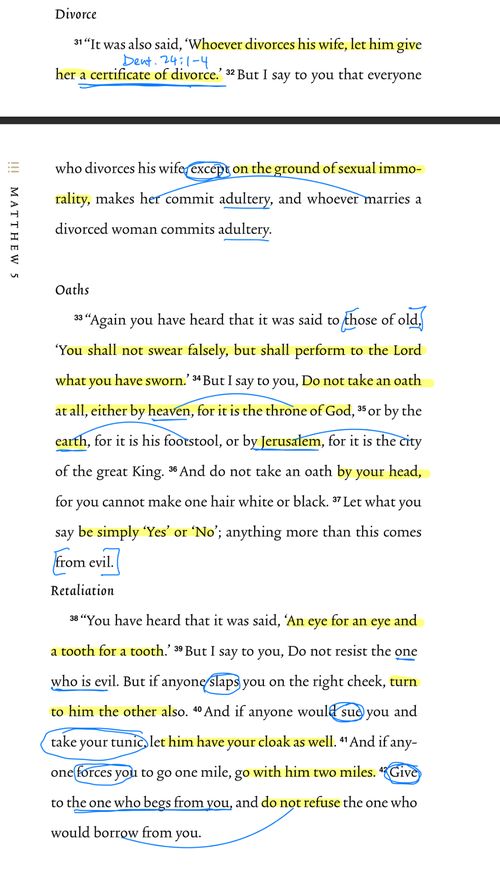
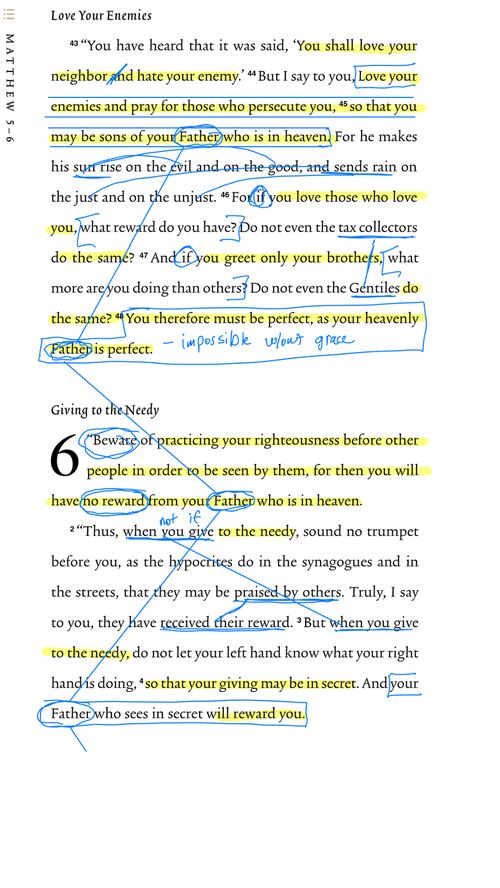
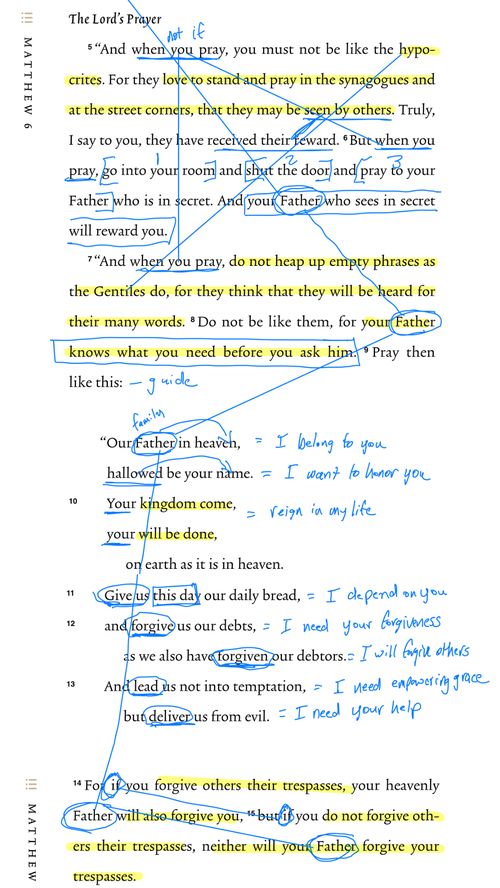

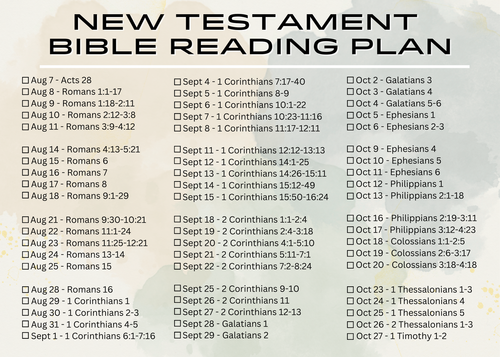

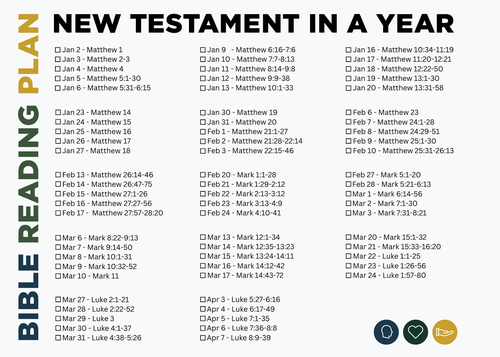
Recent
Archive
2023
January
Happy New Year!He Will Save His People From Their SinsMy Beloved SonTemptation And MinistryThe SermonLeaving, Lying, Limits, Love, Largesse, and The Lord's PrayerTreasure, Anxiety, and JudgmentAstonishing AuthorityStorms, Demons, and HealingJesus Is CompassionateHis Eye Is On The SparrowSwords, Rewards, and MessengersThe Lord of the SabbathBlasphemy, Bad Trees, Signs, and FamilyStories, Sowers, and SoilsParables, Hidden Treasure, and RejectionFame, Food, Fear, Faith, and FringeReal Issues And The Power Of GodDying To Find LifeLike The SunChildren, Temptation, Sheep, And ForgivenessMarriage, Kids, And MoneyTo Serve And Give His Life
February
The ArrivalStories That StingQuestion TrapsHidden Motives And LamentThe End...?UnexpectedReady?Punishment, The Plot, And PerfumeTreachery, Passover, and The CupBetrayal, Injustice, And DenialThe Field Of Blood And The GovernorCrucifixion And DeathAll AuthorityMark—The Beginning Of The GospelHealing, Preaching, And The Forgiveness Of SinEating With Tax Collectors, Fasting, The Sabbath, And An Escape BoatThe Twelve, Blasphemy, Family, And A ParableParables And PowerA Different Kind Of StormPower Had Gone Out
March
Death, Hunger, And MiraclesCommandment Or TraditionDo You Not Yet Understand?The Christ And A Glimpse Of His GloryUnbelief, Confusion, And SinDivorce, Children, And PossessionsTo Give His Life As A RansomHosannaThe Rejected Stone, Taxes, And The Great CommandmentDestruction And The EndNo One Knows, An Anointing, And A Promise To BetrayPassover And GethsemaneThe Kiss, Arrest, And DenialPilate, Simon, And The CrucifixionDeath, Burial, Resurrection, And What\'s NextTheophilus And A Visit From GabrielMary And The MagnificatBenedictusThe Arrival And The ShepherdsSimeon, Anna, And The SpiritFruits Keeping With Repentance And BaptismThe Wilderness, Nazareth, And CapernaumSimon's Mother-In-Law, Fishing, A Leper, And Sins
April
Tax Collectors, Fasting, Sabbath Controversies, And The TwelveWhy Do You Call Me Lord, Lord?Jesus Marveled, A Raised Son, And QuestionsA Sinful Woman And A ParableObeying The Word, A Storm, And DemonsTwelve Years, Twelve Apostles, And SpeculationGreater, Costly, And GloryNot Getting It, The Cost, And AppointedWoes, Neighbors, And What Is NecessaryHelp Us Pray And A Divided Kingdom?Signs, Lights, And WoesHypocrisy, Fear, A Fool, And AnxietyParables, Division, And The TimesWarnings, A Daughter Of Abraham, And Jerusalem, JerusalemA Son Or An Ox, Parties, And DiscipleshipLost ThingsThe Dishonest Manager, The Law, And Anguish In This FlameMillstones And Mustard SeedsPersistent Prayer, Humility, A Childlike Faith, And The Rich RulerEverything That Is Written, A Blind Beggar, And A Wee Little Man
May
A Parable, A Colt, A Prophecy, And A CleansingAuthority, Wicked Tenants, And TaxesThings To Beware Of And WidowsDestruction, Persecution, The Son Of Man, And WatchingThe Plot, Betrayal, Lord's Supper, And Inappropriate BehaviorPrediction, Fulfillment, Agony, Betrayal, And DenialMistreated, Taken Before The Council, Pilate, Herod, And Delivered To Be CrucifiedCrucifixion, Death, And BurialHe Is Not HereDisbelieved For JoyIn The Beginning…The Lamb Of God And A WeddingZeal, What's Inside, And Born AgainHe Must Increase
Categories
no categories
Tags
no tags
